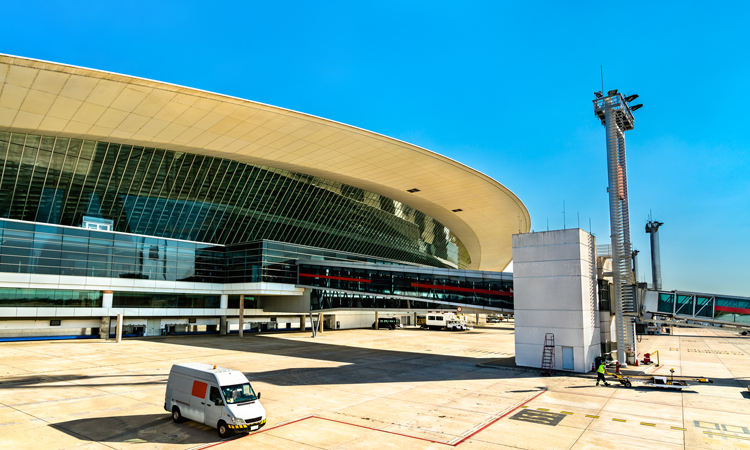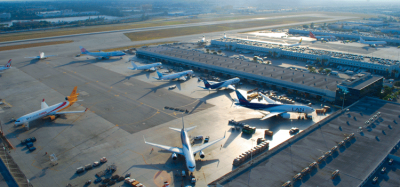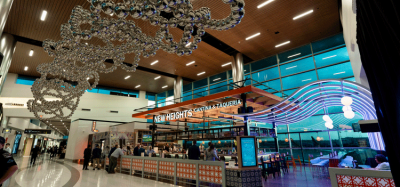It is time for airports to look beyond COVID-19
- Like
- Digg
- Del
- Tumblr
- VKontakte
- Buffer
- Love This
- Odnoklassniki
- Meneame
- Blogger
- Amazon
- Yahoo Mail
- Gmail
- AOL
- Newsvine
- HackerNews
- Evernote
- MySpace
- Mail.ru
- Viadeo
- Line
- Comments
- Yummly
- SMS
- Viber
- Telegram
- Subscribe
- Skype
- Facebook Messenger
- Kakao
- LiveJournal
- Yammer
- Edgar
- Fintel
- Mix
- Instapaper
- Copy Link
Posted: 31 January 2022 | Diego Arrosa | No comments yet
International Airport Review’s Holly Miles caught up with Diego Arrosa, CEO of Aeropuertos Uruguay, a subsidiary of Corporación América Airports, at the ACI World Annual General Assembly in Cancun to find out about the airport operator’s plans for the future, and why Arrosa believes now is the time for the industry to move out of COVID-19’s shadow.


Aeropuertos Uruguay has just received a 20-year extension of its concession of Carrasco International Airport. What plans do you have to invest in the airport, and the infrastructure of the other six regional airports that have been added to the agreements?
We have recently received a 20-year extension on the concession contract for the operation of Carrasco International Airport, which will now last until 2053. In addition, we also received the concession for the construction, conservation and operation of six additional airports in Uruguay located in different regions of the country: Rivera, Salto, Carmelo, Durazno, Melo and Paysandú. This new opportunity to develop and grow Uruguay’s aviation sector is an honour and a testament to our work since we started operating in the country in 2003.
This new network of airports is a strategic project for the country, for the sector and for us, as it reaffirms our deep commitment to connecting Uruguay to the world.
We will be investing USD300 million, split between direct investment, operation and maintenance in the six airports. We will be carrying out infrastructure works, including the modernisation or construction of new passenger terminals, reconditioning works and expansion of runways and platforms, and incorporating new, state-of-the-art equipment and technology. Our plans are to invest in these new regional airports, developing domestic and international travel where possible.
Through our close work with the authorities of the National Directorate of Civil Aviation and Aeronautical Infrastructure, we have determined the specific needs of each of the airports and set deadlines and schedules for the work. We will ensure the necessary works and changes meet the highest safety standards, aligned with the regulations of the International Civil Aviation Organization.
Airports are a source of growth and development of the communities they are set in, they are catalysts for progress
Airports are a source of growth and development of the communities they are set in, they are catalysts for progress, which is why we are so proud to be able to be a part of this initiative. Our mission is to provide Uruguay six additional airports with the highest security, quality and service standards, that help develop the communities, the sector, and the country.
Can you give a general update on how Carrasco International Airport is recovering from the pandemic?
We can’t deny that the past two years have been tough. Today, we are seeing a gradual recovery, which was more evident after the national government opened the borders in November 2021. There is not a domestic market in Uruguay developed yet and approximately 99 per cent of our passengers are international ones. Due to this nature, inevitably we can predict a slower recovery overall than airports with larger domestic market.
The pandemic has left us many learnings, and on the path forward we have more tools to approach the recovery, which might help us on the way. Not just on a technical or operational level, but most importantly, on how we approach our work, our agility and adaptability and our soft skills, such as creativity, resiliency and teamwork. All these acquired a new meaning and importance over the past years, and we believe them to be key on our recovery.
There is still a long way, and there is interesting work to do with the airlines and the companies, to develop this sector to be as large and successful as we can.
How do you think COVID will continue to affect the industry? What trends do you foresee emerging and becoming the new norm?
It is difficult to say to what extent COVID will continue to affect the industry, but this pandemic has taught us that we need to become more comfortable with unpredictability. We cannot know what the future will hold, as different variants continue to emerge, and restrictions of varying degrees continue to evolve to the situation, but we can take the learnings from the past years and we can make sure we are better prepared to deal with this uncertainty and volatility.
Certainly, what the pandemic has taught us, is that we need to be more agile than ever. Our flexibility and the ability to dynamically respond, evaluate and adjust to the shifting landscape will have a vital role to play in the industry’s recovery, and invariably be linked with the strength of that recovery.
It is imperative that we work very closely with all the actors of this ecosystem – governments, airlines, airports, different organisers – to react as quickly as we can. We have learned an important lesson, we are all connected, different actors, industries, countries. This is not time to isolate, but to work closer than ever, to work towards recovery with a common plan.
How have you been driving non-aviation revenues and encouraging passengers to spend more time in the retail outlets?
Non-aviation revenues have come into sharp focus during the pandemic for us, as indeed for airport operators across the world.
Our great ally throughout, is technology. We are focused on implementing further digitalisation across our entire E-Commerce platform. As such, we are working with our concessioners, with our partners, in order to digitalise as much of our offering to our customers. Understandably, we are seeing passengers spending less time in our airport stores. As passengers focus on moving through the airport as quickly and swiftly as possible, dwell time in retail outlets is inevitably less. So, we need to capture these revenues before they come through the airports as much as possible, and digitalisation enables us to do this.
In September 2021, we relaunched our online store, AeroShop. This allows our passengers to purchase a wide variety of products and services designed to simplify and enrich their travel experience. This includes things such as long stay parking, VIP room services, luggage storage, hairdressing and even packs of essential travel items. AeroShop offers passengers the chance to reserve or purchase all of these services online.
The pandemic has left us many learnings, and on the path forward we have more tools to approach the recovery, which might help us on the way.
Our focus to drive non-aviation revenues at all points has been to listen to our passengers, be empathetic to the situation and try to respond in a way that takes that into consideration. Whether it means a new enhanced offer of heath and hygiene related products or the development of a drive-in cinema initiative to provide for entertainment when travel was halted, empathy and creativity have been our key resources during this time.
What is your view of the current global travel restrictions?
Regrettably, at present, it still feels as though we are looking backwards. I believe now is the time to harmonise measures and restrictions. Globally speaking, it is a mess. China is still closed, we are still looking to see what will happen with Australia, while South America is starting to open fast. Now is the time to harmonise travel across the world, or put an end to quarantine measures where they still stand. The industry, and arguably the world, needs to look to the future, how it can develop and grow, and truly emerge from this pandemic.
COP 26 has put fresh focus on sustainability. What work and initiatives are you developing at your airports to make them more sustainable?
Sustainability is key for our organisation, and we have been working hard over the last decade at our airports to ensure sustainability is a fundamental part of our operations.
At Carrasco International, we were the first airport in the region to build our own solar energy plant. Nowadays, about 10 per cent of our energy consumption is generated by our own solar farm. We are also working to replace, or convert, all of our vehicles to electric ones.
We want to make sure that sustainability is also present from the beginning at our new regional airports. We have plans to create partnerships with electric vehicle (EV) companies, with the aim of introducing electric vehicles at all of these six regional airports.
At Carrasco Airport several initiatives in term of waste management and water management are in place in order to ensure the reduction of the footprint of our activities.
We believe passionately in the opportunity for change, and meeting our sustainability aims, reducing emissions and slowing climate change. We are committed to the goal of achieving net zero carbon by 2050.
What do you think we’ve learned from this pandemic?
Without doubt, the need for all actors within aviation to be more agile, dynamic and able to respond quicker than ever. As I mentioned earlier, we have been shown that we need to work very closely with airlines, airports and governments in order to react faster than ever. The reality is that we do not know what the future holds, indeed for this pandemic or any other that may come our way, as much as we might like to try to predict.
COVID-19 has taught us that safety is our priority. The safety of our health is first and foremost for the more than 78 million users in our more than 50 airports around the world. This pandemic has seen our airports implementing intensified cleaning regimes, heightened use of contactless technology and air filtration systems, social distancing practices, to name a few, to keep our passengers, and our staff, safe. Now, our challenge is reassuring our passengers in the strength and safety of these measures, of our airports, of travel, again.
Finally, are you positive for the future?
Absolutely. I am very positive for the future, and for the next few years in particular. The need, the desire for travel, for meeting people face-to-face, is there, whether for business, or for leisure. The ACI WAGA 2021 conference held here in Cancun is a fantastic example of that!


Related topics
Airport development, Contactless / Touchless technology, COVID-19, Non-aeronautical revenue, Passenger experience and seamless travel, Passenger volumes, Retail, Route development, Safety, Sustainability, Tourism


















